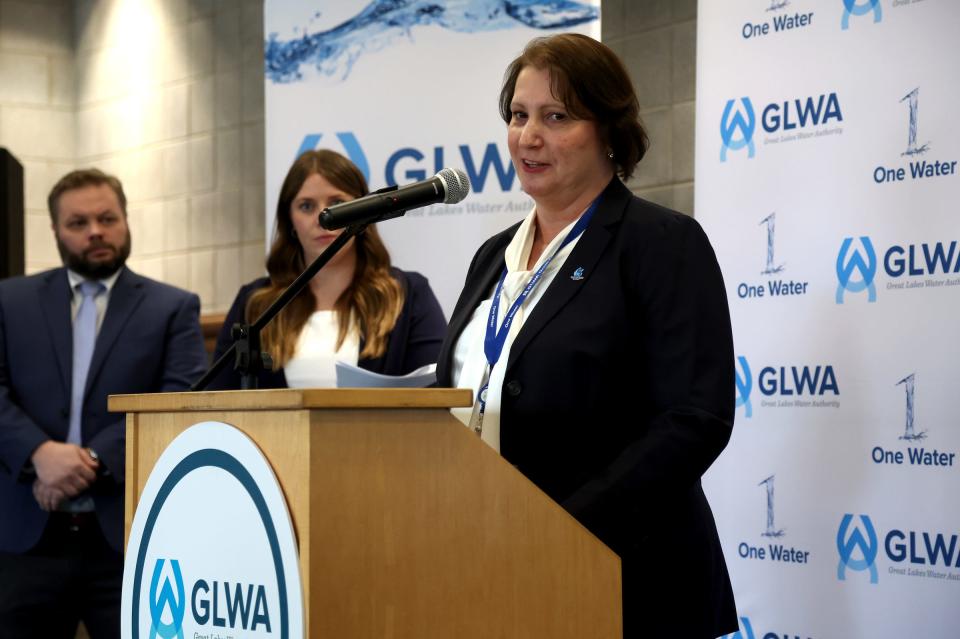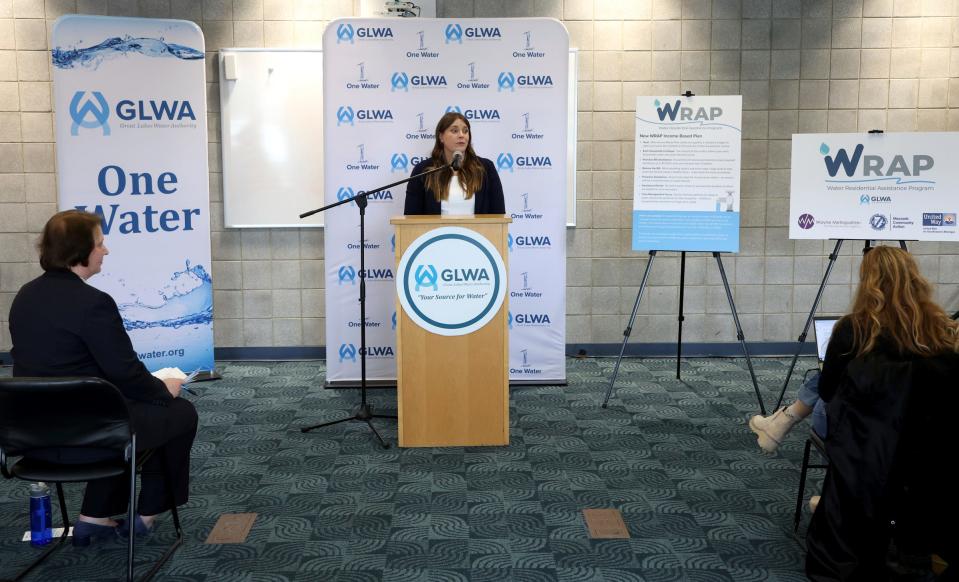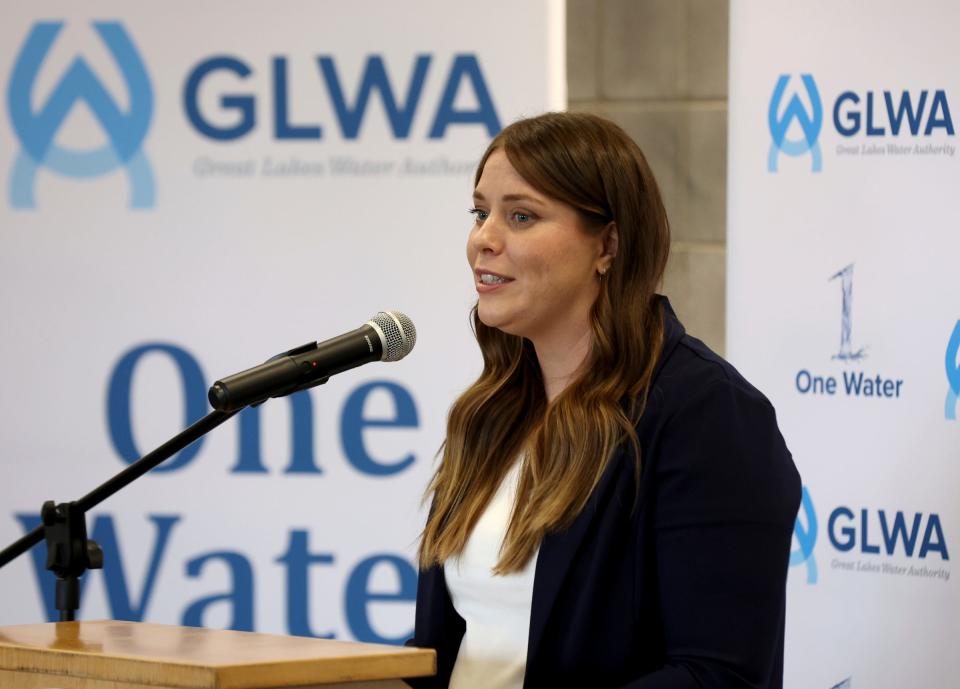Great Lakes Water Authority launches new affordability program
Residents in southeast Michigan who struggle to afford water can apply for a revamped program to help lower their bills.
The Great Lakes Water Authority announced updates to its Water Residential Assistance Program (WRAP), offering bill credits based on a household's income and water and sewer bill amount for up to two years, assistance paying off arrears and water conservation aid.
The plan — funded by about $4.1 million per year with GLWA's budgeted revenue divided up at the county level — is dubbed the WRAP Income Based Plan and is for areas outside of Detroit. GLWA's service region includes: Flint, Detroit, Lapeer, Macomb, Monroe, Oakland, St. Clair, Washtenaw and Wayne counties. Detroiters are eligible for a separate affordability program, called the Lifeline Plan, which is partially funded by WRAP dollars. GLWA provides drinking water services to nearly 40% and wastewater services to about 30% of the state's population.
The initial WRAP program provided a $25 a month bill credit, but the new plan seeks to cap what an eligible family pays toward their water bill to 3% of their household income.

"There is need throughout our service area for homes that are facing challenges paying their bills, and ultimately we want to be able to prevent any shutoffs," said Nicolette Bateson, GLWA's chief financial officer and treasurer during a news conference Wednesday.
More:Great Lakes Water Authority OKs 2.75% water rate increase
How program will work
The new program is available to qualifying households that receive water and sewer services from GLWA. Participants can get help for up to two years, but eligible senior citizens and people with permanent disabilities can get bill credit help indefinitely, officials said.
Applicants must have a gross household income at or below 200% of the federal poverty level (which, in 2023, is $49,720 for a family of three), be responsible for paying the bill and live in a home they either own or rent.
"Bill credit amounts are unique to each household," said Madison Merzlyakov, GLWA affordability and assistance manager. "Upon enrollment, the household income and amount of the water and sewer bill will be reviewed. Bill credits are determined so that after that credit is applied, the amount the household is expected to pay toward their bill is 3% of their household income."
For instance, a household with an annual income of $10,000, which has an average yearly bill of $1,000, would be eligible for a $700 bill credit, bringing what they owe down to $300 that year. Previously, that family would have received $25 in a monthly bill credit — or a total of $300 in assistance for the year.
The program can also eliminate up to $1,200 in past due bills for the first year and another $1,200 for the second year.

Conservation measures, Merzlyakov said, include a home water audit, information on water usage and minor plumbing repairs up to $2,000. Examples of those repairs may look like replacing plumbing fixtures in the bathroom, kitchen or utility room that are leaky or don't work. Households are expected to make on-time payments toward remaining bill amounts.
GLWA works with social service agencies to administer the WRAP program. The United Way for Southeastern Michigan joined this year to provide services to Oakland County residents, directing callers to services such as transportation, housing needs and food assistance, said Jeffrey Miles, United Way's senior director of economic mobility and social navigation.
Detroit's Lifeline Plan
Over the summer, the Detroit Water and Sewerage Department launched the Lifeline Plan based on income and usage to help people reduce their bills. That program, which began in August, is expected to run through 2024 with current funding as officials lobby for more statewide dollars to keep it going beyond next year. About $5 million in WRAP dollars partially backs the Lifeline Plan.
"We are focused on securing the state funding through the annual budget, which as it stands in Gov. Whitmer’s proposal, is $40 million statewide," said Bryan Peckinpaugh, a DWSD spokesperson in a Wednesday email.
As of Monday, more than 10,700 households enrolled in the Lifeline Plan and more than 5,800 applications are still pending approval. The Wayne Metropolitan Community Action Agency, which is administering the program, expects to process the applications by the end of March, Peckinpaugh said.
"Our focus is on getting through the current Lifeline Plan applications, then launching another round of outreach this spring. We will not interrupt water services to households for an inability to pay. We reserve our legal option to use the collection tool for accounts that are delinquent, the household is not low-income or not had a recent health emergency or job loss, and they have the ability to pay their water bill," Peckinpaugh said.

GLWA's program soft-launched in October. As of the end of January, more than 2,200 households enrolled, Merzlyakov said. Roughly $4 million is allocated each year for the program. For this fiscal year, from July through June, GLWA spent $1.6 million in WRAP funds, not including Detroit, and about $2 million remain, officials said.
GLWA is telling communities not to shut off water to households that are enrolled in the WRAP program.
Last week, GLWA approved a 2.75% hike for wholesale and wastewater rates for the 2024 fiscal year.
How to apply
Detroit: Wayne Metropolitan Community Action Agency; 313-386-9727; www.waynemetro.org/dwsdlifeline
Wayne County: Wayne Metropolitan Community Action Agency; 313-386-9727; www.waynemetro.org/wrap
Macomb County: Macomb Community Action; 586-469-6464; mca.macombgov.org/mca-wrap
Oakland County: United Way for Southeastern Michigan; 248-983-5656; uwsem.smapply.org/prog/utilities
Flint: Wayne Metropolitan Community Action Agency; 810-510-9727; www.waynemetro.org/wrap
Lapeer: Macomb Community Action; 586-469-6464; mca.macombgov.org/mca-wrap
Monroe: Wayne Metropolitan Community Action Agency; 313-386-9727; www.waynemetro.org/wrap
St. Clair: Macomb Community Action; 586-469-6464; mca.macombgov.org/mca-wrap
Washtenaw: Wayne Metropolitan Community Action Agency; 313-386-9727; www.waynemetro.org/wrap
Nushrat Rahman covers issues related to economic mobility for the Detroit Free Press and BridgeDetroit as a corps member with Report for America, an initiative of The GroundTruth Project. Make a tax-deductible contribution to support her work at bit.ly/freepRFA.
Contact Nushrat: nrahman@freepress.com; 313-348-7558. Follow her on Twitter: @NushratR.
This article originally appeared on Detroit Free Press: Metro Detroit water authority launches new affordability program

